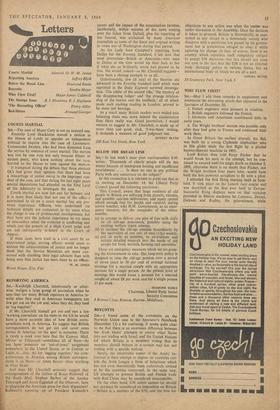REPORTING AMERICA
SIR,—Randolph Churchill, intentionally or other- wise, maligns a large group of journalists when he says that too many British reporters in America re- write what they read in American newspapers, too few get out on the job and, when they do, they tend to 'tag together.'
If Mr. Churchill himself got out and met a few 'working journalists' on his visits to the US he would have a more accurate idea of how British corre- spondents work in America. To suggest that British correspondents do not get out and cover news stories in America 'on the spot' is nonsense. There is rarely a week over here that the Express, Mail, Mirror or Telegraph—sometimes all of them—do not have someone on 'out-of-town' assignment somewhere in the United States, or in Central or
Latin As for 'tagging together,' the com- petitiveness in America among British correspon- dents is as fierce—at times fiercer—than anything in Fleet Street.
And does Mr. Churchill seriously suggest that correspondents of the calibre of Bruce Rothwell of the Daily Mail, Stephen Barber of the Sunday Telegraph and Joyce Egginton of the Observer, have to plagiarise the American press for their dispatches? Rothwell's summing up of President Kennedy's
career and the impact of the assassination (written, incidentally, within minutes of the news coming over the ticker from Dallas), plus his reporting of the funeral, was acclaimed by many American journalists as some of the finest and original writing to come out of Washington during that period.
As for Lady Jean Campbell's reporting from Dallas for the Evening Standard, 1 am sure that most journalists—British or American—who were in Dallas at the time would tip their hats to her if what she so brilliantly wrote had proved to be true. She would, indeed—as Mr. Churchill suggests— have been a shining example to us all.
Unfortunately, few (if any) of the theories she advanced in the Evening Standard (and which were reprinted in the Daily Express) survived investiga- tion. The riddle of the second rifle,' the mystery of the disappearing lodger' and 'the strange relation- ship of the lawyer and the landlady,' all of which made such exciting reading in London, proved to be mere red herrings.
As a result many British readers were misled into believing there was more behind the assassination than there really was. Good journalism, I would venture to suggest to Mr. Churchill, is made up of more than just good, slick, 'I-was-there' writing. It demands a measure of good judgment too. JEFFREY ULM, 300 East 51st Street, New York






























 Previous page
Previous page